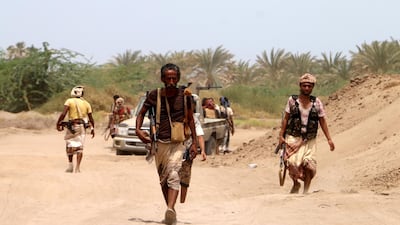The decision to redeploy troops in Yemen is consistent with UAE foreign policy, which is underpinned by dialogue and seeking de-escalation. On Monday, a senior UAE official said that while the nation has trained 90,000 Yemeni government fighters, some UAE troops are being redeployed and equipment has been moved, in co-ordination with other coalition allies.
This is not about relinquishing control to the Iran-backed Houthis, who continue to wage war against the internationally recognised government of Abdrabu Mansur Hadi but paving the way for a lasting political solution. It marks a shift from “a military-first strategy to a peace-first strategy,” according to the official and comes months after UN-backed talks in Sweden, which saw rebel and government forces agree to pull back from the vital port city of Hodeidah. Important measures have yet to be implemented and fighting continues on several fronts.
Nevertheless, the UAE is committed to the Stockholm agreement and is working hard to bring an end to Yemen’s five-year war, which has taken a considerable human toll.
Since it joined the Saudi-led coalition to reinstate Mr Hadi’s government in 2015, the UAE has achieved many of its objectives in Yemen. Swathes of land have been reclaimed from the Houthis and the Yemeni army has improved its capabilities, while the UAE has helped to undermine Al Qaeda’s operations and presence in the country. Overall, the UAE has provided the Yemen with Dh20.53 billion in aid.
Still, there is plenty of work to be done, not least because of Houthi intransigence. Also on Monday, the coalition intercepted a Houthi drone launched into Saudi Arabia and foiled an attack on commercial ships in the Red Sea. Meanwhile, the Houthis claim to have developed new missiles and drones, which they have used – with the backing of Tehran – to attack civilian targets, such as Saudi's Abha airport.
The Yemen troop redeployment comes at a time of heightened tensions in the region, with Iran escalating on a number of fronts and American sanctions taking their toll on the country. As the official said, the UAE "is not trigger happy" and is pursuing a cool-headed foreign policy, presenting a stark contrast with Tehran, which continues to threaten regional stability. Iran has now stepped up its nuclear enrichment, spurring Gulf states and their allies into diplomatic action.
What the people of Yemen need most is an end to a war that has ushered in widespread famine and a deadly cholera outbreak. The UAE has been clear in its commitment to a political solution and the Houthis must now follow suit. Pressure must be mounted on the rebels and their Iranian backers to halt their attacks, and work towards a political solution to end the terrible suffering of Yemenis.

